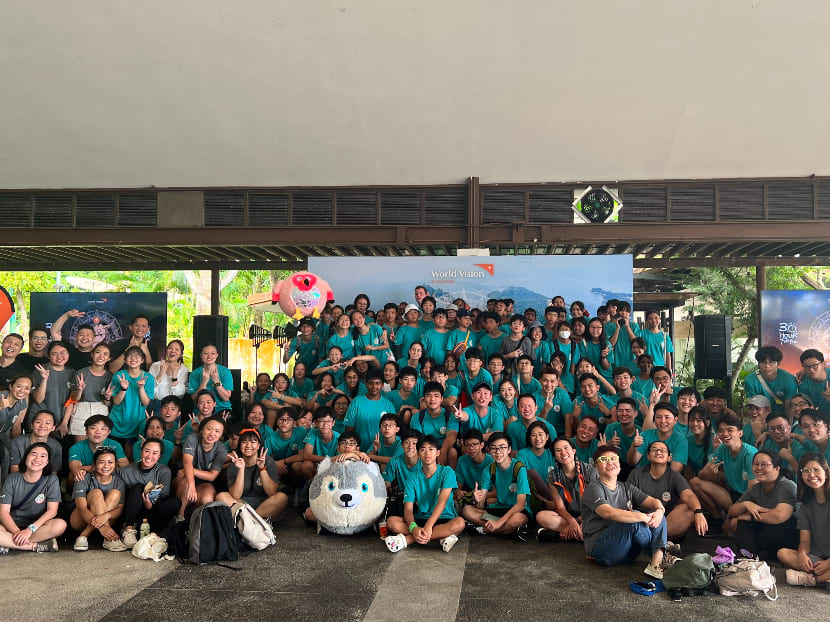In fasting for 30 hours, Singapore youths get a taste of global food security challenges

Participants at last year's 30-day fast by World Vision Singapore.
SINGAPORE — What does it feel like to go for 30 hours on end without food?
For 17-year-old Krishnaaram Muthukumaran, it “wasn’t too bad” – but only during the first few hours.
“The effects of fasting really set in during the second half of the day, when we were going around the island doing various activities under the hot sun. It got more tiring as the day went on,” said the JC1 student at St Joseph’s Institution.
He had participated in last year’s 30-hour famine held by international Christian humanitarian organisation World Vision.
The event, organised annually for more than three decades, is designed to raise awareness about the realities vulnerable children face in battling hunger and poverty due to conflict and climate disasters.
Krishnaaram will be participating in the event again this year, despite memories of his maiden attempt still fresh in his mind.
“The hardest part was resisting the temptation to eat once I was home on the first day, even though nobody was watching,” he said.
“I think the resilience and self-control needed to continue fasting throughout the 30 hours was harder than the actual fasting itself.”
It had given him a deeper appreciation of the struggles people in less privileged parts of the world go through on a daily basis.
“Although I had previously heard and learnt about people facing food insecurity, actually going through the experience of not being able to eat – even for just 30 hours – made me much more aware of how those facing food insecurity might feel and allowed me to better empathise with them,” he said.
“At the same time, I think we can use what we learned from this experience, and the platforms we have, to spread awareness about this issue.”
As part of the 30-hour famine, youth participants aged 13 to 30 will:
- Fast from food for 30 hours
- Navigate interactive and educational station games which simulate the experiences of children living in countries affected by conflict and climate disasters
- Hear first-hand accounts of guest speakers on the frontline of humanitarian work
This year’s event, themed “Hunger Trials”, will be held between May 18 and 19 at Fort Canning Park.
Having taken part in the event in 2023 and 2021, 18-year-old Tabitha Lau said it taught her not to “take basic necessities such as clean food and water for granted”.
“I also better understand the challenges those facing the problem of food insecurity have, and what I am able to do to help them despite not being in direct contact with them,” said the JC2 student at Anglo-Chinese Junior College.
She now frequently discusses the topic with family and friends to discourage food wastage.
WHAT CAN PARTICIPANTS EXPECT AT THIS YEAR’S 30-HOUR FAMINE?
The 30-hour fast will begin at 12pm on May 18 and last till 6pm the next day.
Asked why a period of 30 hours was chosen, chief executive officer of World Vision Singapore Benjamin Tan told TODAY that the duration is one that can be achieved with “reasonable effort and perseverance, but not without discomfort”.
On the genesis of the 30-hour famine, Mr Tan said it began in 1971 when a teenage girl from Canada was exposed to the plight of children living in Ethiopia who did not have enough food.
Heartbroken, the teenager and her friends decided to fast to raise funds. As they fasted, their friends and church members donated funds for every hour that they went hungry.
The group then channelled these donations to the Ethiopian community through World Vision, said Mr Tan.
It eventually became a global initiative the non-profit organisation ran every year.
Today, besides fasting for 30 hours, the youth participants also take part in activities organised by World Vision.
For instance, there would be stations that simulate the experiences faced by people in countries affected by conflict and climate disasters such as droughts.
Participants at the station are required to forage for wild food to feed themselves and their families.
Mr Tan said: “The circumstances faced by the world’s most vulnerable children cannot be accurately created in Singapore; they can only be simulated through challenges, which provide an approximation of first-hand experience.”
He believes the event would open participants’ eyes to the reality of poverty and hunger.
“Our youth will grow to become future leaders, and this programme seeks to inculcate a greater sense of empathy through a limited first-hand experience – which we believe is important in empowering them to become more effective, informed, and well-rounded global citizens,” said Mr Tan.

Beyond the station activities, youth participants will also engage in discussions and hear first-hand accounts from guest speakers on the frontline of humanitarian work.
This year’s line-up of speakers include:
- Dr Kyi Minn, national director of World Vision Myanmar
- Ms How Hwee Young, Asia Pacific regional chief at European Pressphoto Agency
- Ms Lam Bao Yan, co-founder of Love on Ukraine and director of Genesis Architects
Dr Kyi and Ms Lam said that they hoped the youth participants would gain a deeper understanding of the challenges faced by those living in extreme poverty and hunger, and that they would not only gain empathy in the process but also feel empowered to advocate for change.
Ms Lam said: “The three things I want to tell young people (is to not) be too apathetic about what’s going on.
“Whatever you study, whatever you’re involved in, do it with all your heart – that it can be used for impacting lives and nations.
“Thirdly, your efforts are never too small: Pooling together, advocating, championing and coming together… even your pocket money and your cards of encouragement will make a difference.”
Dr Kyi added: “The event is the start, not the end of advocating for the global hunger issue.”
He added that there are many ways for the young to continue helping vulnerable communities overseas.
This could include advocating for issues of concern through continuous self-learning, doing research projects, writing articles, or getting involved with other advocacy activities similar to the 30-hour famine.
Youths may also consider sponsoring a child, spreading awareness about global hunger, and helping in their own ways to address its causes, which include climate change, food security and peace building.
To find out more, interested individuals can visit www.worldvision.org.sg/30HFC2024 or https://30hourfamine2024.eventbrite.sg.
Registration closes on May 3. All proceeds from the S$45 registration fee will go towards World Vision’s Global Hunger Response, which supports communities in the Democratic Republic of Congo, Ethiopia, and Rakhine, Myanmar.
Over 30,000 people, including 21,000 children, will benefit from school meals, medicines and food security initiatives, said World Vision.








